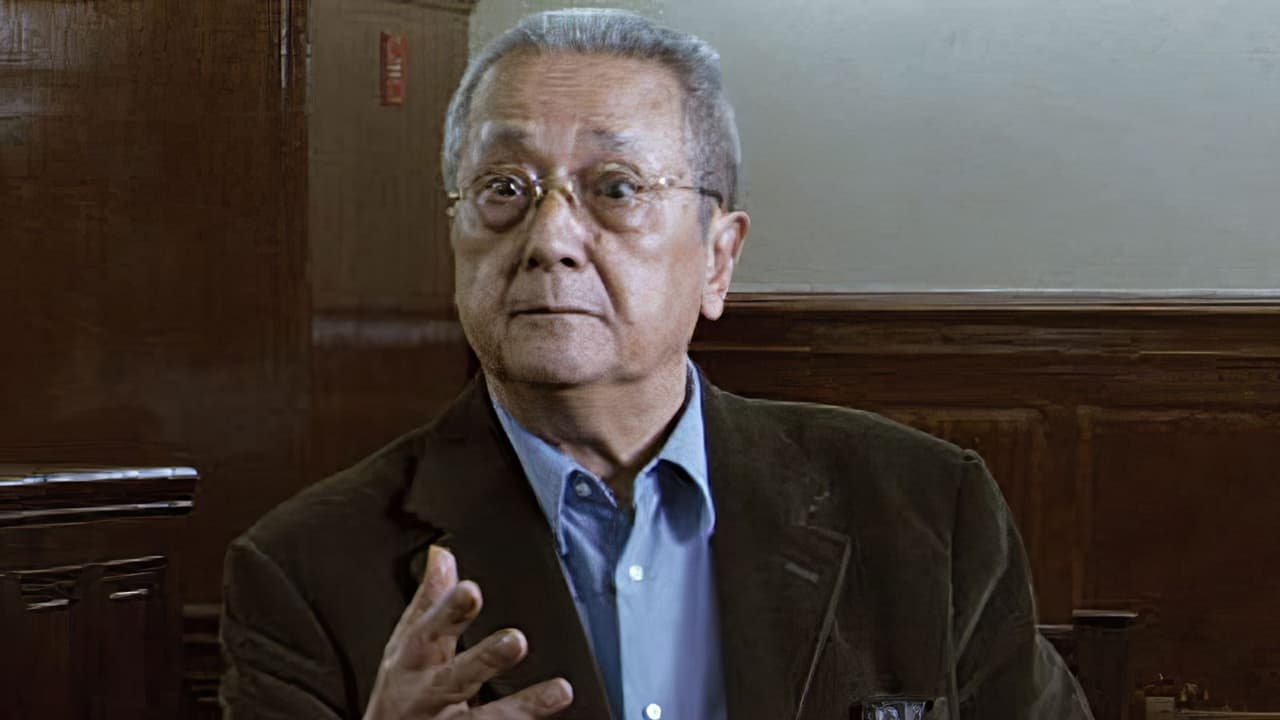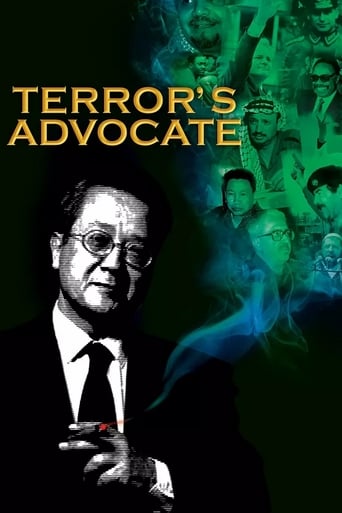

Surprisingly incoherent and boring
... View MoreAfter playing with our expectations, this turns out to be a very different sort of film.
... View MoreAmazing worth wacthing. So good. Biased but well made with many good points.
... View MoreI didn’t really have many expectations going into the movie (good or bad), but I actually really enjoyed it. I really liked the characters and the banter between them.
... View MoreFrench-Swiss producer and director Barbet Schroeder's documentary feature is based on his opinions about his main interviewee. It premiered in the Un Certain Regard section at the 60th Cannes International Film Festival in 2007, was shot on locations in Algeria, France, Cambodia and Lebanon and is a French production which was produced by producer Rita Dagher. It tells the story about a person of Vietnamese and French origins who was born in Thailand on the 5th of March in 1925, raised on Réunion Island in France, taken to a mass grave by his parents as a ten-year-old, served his initial service as a seventeen-year-old, joined the French Communist Party as a twenty-year-old, studied literature and eastern languages in Paris, France, began studying law as a thirty-year-old after his twin-brother named Paul Vergès was arrested for the murder of a political opponent of his father named Raymond Vergès and as a thirty-two-year-old lawyer was introduced to an Algerian Muslim and political activist named Zohra Drif and asked to defend an Algerian member of the National Liberation Front Algeria named Djamila Bouhired. Distinctly and precisely directed by French-Swiss filmmaker Barbet Schroeder, this finely paced documentary which is narrated interchangeably from multiple viewpoints though mostly from the central person's point of view, draws an informative portrayal of a son, brother, husband, father, anti-colonist and renowned 20th and 21st century author and defense attorney with both French and Algerian citizenship named Jacques Vergès (1925-2013), and his relationship with his clients. While notable for its versatile milieu depictions and reverent cinematography by cinematographers Caroline Champetier and Jean-Paul Perrard, this narrative-driven story about the history of international terrorism and France-Algeria relations, connections, colonialism leading to anarchy, terrorism and war and what it is like for people to live in colonized countries, where interviews with friends, Cambodian, Algerian, Palestinian, German and Lebanese freedom fighters, members of Popular Front for the Liberation of Palestine, members of Khmer Rouge, members of Revolutionary Cells, secret service agents, Stasi agents, revolutionary Islamists and Christians, journalists, jurists, collaborators, politicians, historians and philosophers talks about their experiences, political views and views on the person in question, depicts a majestic and mysterious study of character and contains a great and timely score by composer Jorge Arrigada. This somewhat humorous though thematically on the contrary, poignantly atmospheric and retrospectively historic documentary feature from the late 2000s which is set in the late 20th century and early 21st century in European, Middle eastern and Asian countries and where the life of a profound jurist and character with character who surpasses many great acting performances in cinema history, who defended terrorists, dictators and war criminals, who worked in mysterious ways and who in the 1970s after having gotten married with a client and converted to Islam went incognito for eight years, is placed into an historical context which commendably emphasizes the irrevocable consequences of terrorism and how closely associated state officials are with militant groups, is impelled and reinforced by its fragmented narrative structure, rhythmic continuity, cinematic use of archival footage, news articles and photographs, interviews which ranges from Tunisian journalist Lionel Duroy, German former exile Hans-Joachim Klein to German photographer Magdalena Kopp and comment by Mansour : "But after having considered the case,- maybe they heard voices like Jeanne d'Arc did, they chose me." An investigative biographical mystery.
... View MoreThis movie gives an astonishingly revealing picture of the outspoken French lawyer Jacques Vergès, who defended such controversial figures as the terrorist Carlos, the Nazi criminal Klaus Barbie or a member of the Algerian resistance against French rule, Djamila Bouhireb. Jacques Vergès even confirms that he would have defended Adolf Hitler IF he pleaded guilty (George Steiner did it in his formidable book 'In Bluebeard's Castle').The movie reveals also the existence of a right-wing - religious financial network which provides judicial help for former fascists, like Nazi criminals. However, Barbet Schroeder could not uncover the exact nature of Jacques Vergès's pro-Palestinian actions or his support of the Red Khmer regime (on which he gives here, again controversially, a more or less positive comment) during the years of his life when he acted 'behind the scenes'.This movie is a fascinating portrait of an iconoclastic rebel with a formidable intelligence and a profound analyzing capacity of the dark regions of man's nature and the amoral or immoral motives behind his behavior. By incorporating this behavior in a global context of 'a world at war, a resistance to a colonial rule or a defense of minorities', he could (can) denounce all the parties involved or attack frontally the existing global world order and its alleged morality. A must see.
... View MoreBarbet Schroeder's portrait of French attorney Jacques Vergès. You've seen him defending people like Klaus Barbie, Carlos the Jackal, Pol Pot as well as other dictators and terrorists.This is a complex story of a complex man and it essentially tells the tale of the man from World War 2 until today. (And even at 140 minutes the film leaves a great deal out). Here is man of his time, who met and defended with many of the famous and infamous people of the last fifty years. He seems to be a man who generally believes in the right of the oppressed to stand up to their oppressors and to have some one to stand up for them. However this is not just the story of a man who fights for the oppressed but it is also the story of a man entangled in things that will cause many to question just how slick a guy is Verges. Many of the terrorists and dictators he defends are in fact his friends, and he is not doing it for the love of cause but also for the love of the finer things.I liked the film a great deal. To be certain I was lost as to bits of the history and who some people were, but at the same time the film isn't about the history, so much as Verges moving through it. This is the story of the man, his causes and to some degree his women. What exactly are we to make of Verges? I don't know, but I sure do think that he and his life make for a compelling tale. I loved that my idea of what Verges is changed. I loved that I was completely confused at the end as to what I thought, confused in a way that only a film that forces you to think can do. In the end I don't know what I think of Verges, and I love that I will have to sit and reflect on what transpired on screen and in the man's life for a good long while.Certainly one of the better feature length theatrical documentaries to come down the pike in a while.See it...probably more than once. See it and then discuss it, it will get the gray cells of your brain working.8 out of 10.
... View MoreIn the movies lawyers have often been depicted as honest guys who try to do their best to defend their client, but also as vicious fellas who do the job just for money or fame, even if that implies having dangerous clients (the culmination of such a concept was Taylor Hackford's The Devil's Advocate). And somewhere in between we can put Jacques Vergès, the French attorney around whom Barbet Schroeder has constructed his new film, the documentary Terror's Advocate.The title derives from the case that made Vergès famous at the beginning of his career: he was asked to defend a group of terrorists, responsible for a series of killings in Algeria. Of course, these men and women claimed to be freedom fighters, that what they did was the right thing to do. Vergès shared their ideals, managed to get them all out of jail and even married one of them. Subsequently he was always hired for controversial cases, and always ended up winning, even when his clients were former Nazis or Holocaust deniers.The point of the movie is this: what should people think of Vergès? In fact, the opening caption says: "This film represents the director's personal point of view on Jacques Vergès", yet ironically Schroeder's opinion is not clear. While he seems to agree with the titular lawyer in the first half, saying that the Algerian terrorists had good intentions but used the wrong means (and it is hard not to think likewise, especially after seeing Gillo Pontecorvo's The Battle of Algiers, based on those events), he does not directly express his feelings on Vergès' supposed ties with numerous German terrorists, some of which were involved in the 1972 Olympic Games massacre in Munich.As a consequence, the ambiguous attorney never really comes off as either good or bad: he does seem to have some kind of moral standards (when asked if he would have defended Hitler, he answers: "I'd even defend Bush, but he would have to plead guilty") and claims he has just been doing his job the whole time, but he refuses to comment on his alleged connections with German criminals, spreading no further light on the matter, nor does he reveal exactly what happened during his 12-year "disappearance", which he apparently spent in Paris for purposes unknown.Nonetheless, it shows that Vergès has two essential qualities for a good lawyer: charisma and eloquence. And he knowingly uses those tools while being interviewed, providing valuable insight on a previously unseen side of the legal system and making Terror's Advocate an intriguing picture, although clearly not to everyone's taste.
... View More